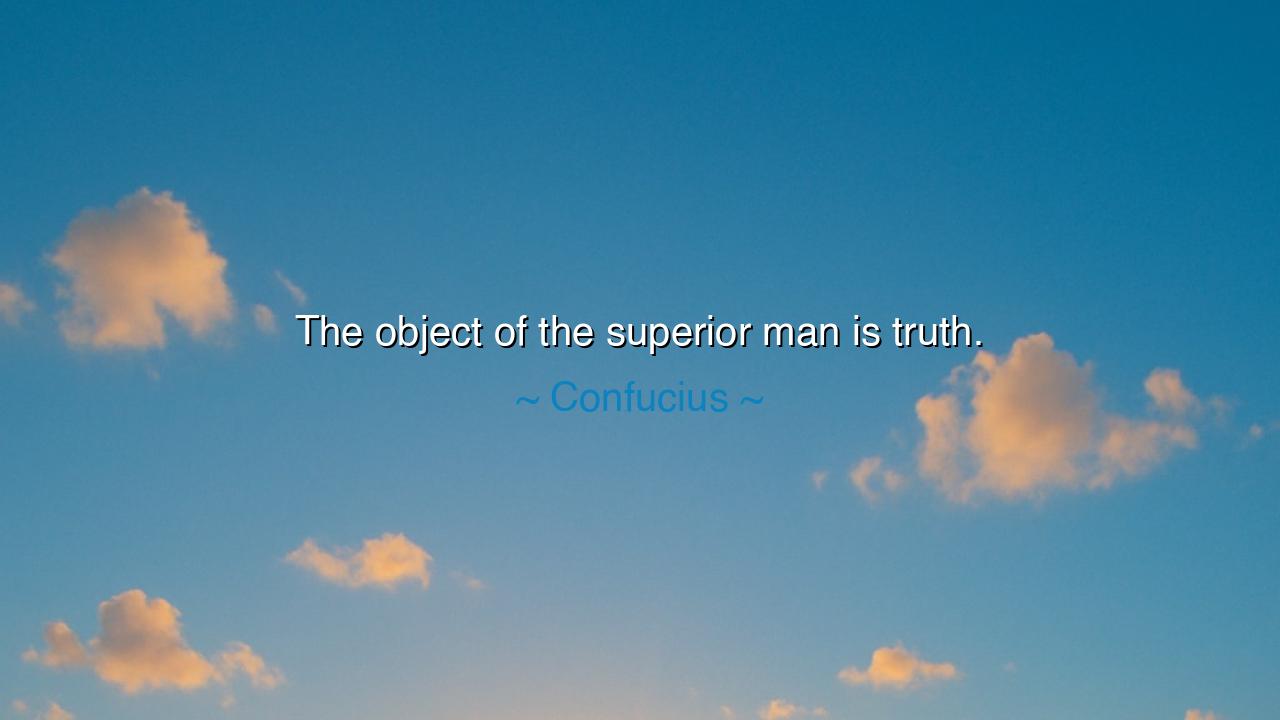
The object of the superior man is truth.






Confucius, the great sage of the East, once declared: “The object of the superior man is truth.” These words, though simple in form, carry the weight of timeless wisdom. They remind us that the highest aim of a noble spirit is not wealth, not power, not fame, but truth itself. For the superior man, the path of life is not measured by worldly gain, but by the alignment of his heart, his words, and his deeds with what is real, eternal, and just.
To the ancients, the superior man was not one exalted by birth or riches, but one exalted by character. He was patient, disciplined, and devoted to what is right. Confucius spoke in a time of chaos, when rulers sought dominion and men sought advantage. Yet he held firm that the true object of life was not advantage but truth—that which harmonizes human beings with Heaven, with one another, and with themselves. For without truth, society collapses into deceit, and the soul decays in falsehood.
Consider the example of Abraham Lincoln. He faced immense pressure to preserve the Union at any cost, even by tolerating slavery. Many counseled compromise, yet Lincoln knew that such compromise would be a betrayal of truth. His Emancipation Proclamation was not only a political act—it was the superior man’s devotion to truth, even in the midst of war. It was costly, it was contested, and it tore at the heart of the nation, but it aligned the country with a deeper reality: that all men are created equal. His greatness lay not in cunning or strategy, but in his commitment to truth above all.
The truth is not always pleasant. It may demand sacrifice. It may strip away illusions we cling to. But Confucius teaches us that it is the guiding star for the superior man. Just as a compass points to the north, truth anchors the soul when all else shifts. Wealth may vanish, power may crumble, but truth remains. The superior man, by making truth his object, builds his life on something unshakable.
Yet this is not only for leaders and sages—it is for all of us. In our daily lives, we often seek comfort over truth, appearances over substance, convenience over honesty. But in doing so, we become lesser. To follow the way of the superior man is to choose truth even when it is difficult—to speak honestly, to live authentically, to seek understanding rather than illusion. For in this way, our lives gain dignity, and our souls gain peace.
The lesson is clear: do not waste your life chasing shadows. Do not make your object wealth, for it withers; nor power, for it corrupts; nor pleasure, for it fades. Make your object truth, for it alone endures. When you align your life with truth, you walk in harmony with the eternal, and your words and deeds bear lasting fruit.
Practically, this means listening before speaking, reflecting before judging, and questioning before believing. It means admitting when you are wrong, standing firm when you are right, and seeking wisdom beyond appearances. It means living in such a way that when others look upon you, they see not deceit or hypocrisy, but integrity.
Thus remember Confucius’ teaching: “The object of the superior man is truth.” To pursue truth is to walk the noble path, to live in strength, to inspire generations. The world is filled with those who chase wealth and power, but few who pursue truth. Be among the few. For though the road is narrow, it leads to greatness, and its light will never fade.






TTChu Thanh Thao
I find it interesting how Confucius frames truth as the goal of a superior man. It makes me wonder how much of our modern world still values truth over convenience or comfort. Is there room for compromise when it comes to truth, or is it always an all-or-nothing pursuit? What does it mean to live a life devoted to truth, and how can we balance that with the complexities of everyday life?
HNHanh Nguyen
Confucius seems to elevate truth as the highest virtue, but I wonder—what happens when the truth conflicts with practicality or the well-being of others? Is truth always the guiding principle, or should it sometimes be tempered with compassion or discretion? Can we say that someone who pursues the truth relentlessly is truly ‘superior,’ or might they risk alienating others in the process?
CNDang cap nhat...
I’m intrigued by Confucius’ perspective on truth being the ultimate aim for the superior man. But how does one pursue truth without getting lost in relativism? How do we distinguish between the truth that is worth pursuing and the truth that might be subjective or partial? Does the quest for truth ever come with a responsibility to consider the consequences it might have on others?
ATHoang Anh Thu
Confucius’ words about truth being the object of a superior man really made me reflect on the role of honesty and integrity in our own lives. Does striving for truth always make us superior, or could it be that sometimes the pursuit of truth can cause harm or division? Can one be a ‘superior’ person if their pursuit of truth leads them to act in ways that alienate others, even if their intentions are pure?
Ssolozero9
This quote seems to suggest that truth is the highest goal for anyone striving for excellence. But how do we define ‘truth’ in a world where different perspectives often clash? Is there one ultimate truth, or does it vary from person to person? And if seeking truth is the path of a superior man, does that mean the pursuit of truth should always come above all else, even when it’s uncomfortable?